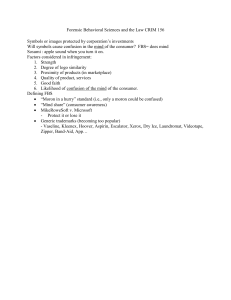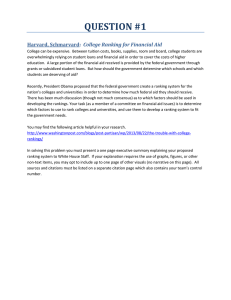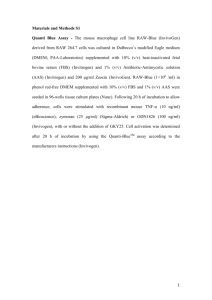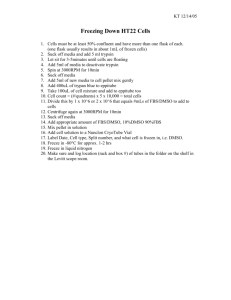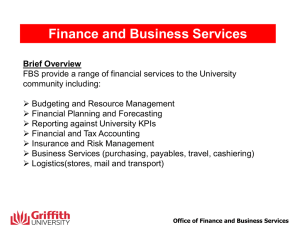FBS Facilitator Training: Communication & Effective Facilitation
advertisement
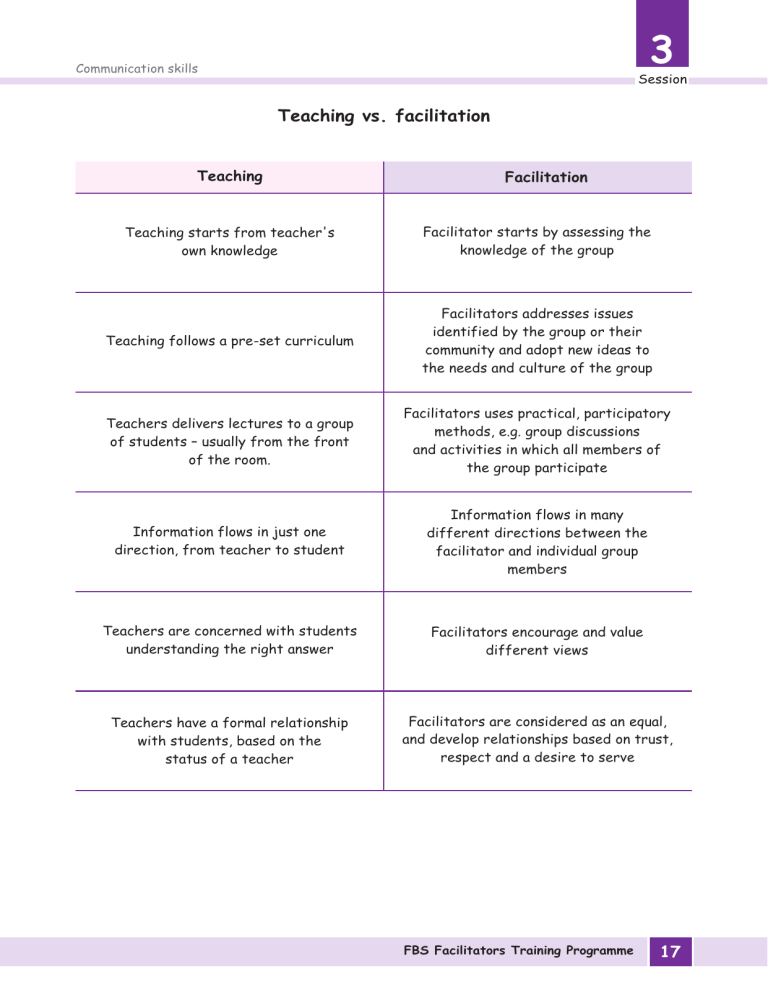
3 Communication skills Session Teaching vs. facilitation Teaching Facilitation Teaching starts from teacher's own knowledge Facilitator starts by assessing the knowledge of the group Teaching follows a pre-set curriculum Facilitators addresses issues identified by the group or their community and adopt new ideas to the needs and culture of the group Teachers delivers lectures to a group of students – usually from the front of the room. Facilitators uses practical, participatory methods, e.g. group discussions and activities in which all members of the group participate Information flows in just one direction, from teacher to student Information flows in many different directions between the facilitator and individual group members Teachers are concerned with students understanding the right answer Facilitators encourage and value different views Teachers have a formal relationship with students, based on the status of a teacher Facilitators are considered as an equal, and develop relationships based on trust, respect and a desire to serve FBS Facilitators Training Programme 17 4 Effective facilitation Session Session # 4: Effective facilitation Effective facilitation is .. Instructions Think of any workshop you have attended in the past and been particularly struck by the quality of the facilitator. Keeping in mind this person, and this workshop, answer the questions below: 1. What are the main roles of a participant? 2. What are the main characteristics of a facilitator? 3. What does a good facilitator do? 4. 1.What are the key rules for a facilitator? 18 FBS Facilitators Training Programme 4 Effective facilitation Session Introduction to facilitation Facilitate means 'to make easy'. Facilitation is the glue that holds a group together. The role is to work with a group of farmers who are in much the same situation, to draw-out knowledge and ideas from different members of a group, and to help them learn from each other and to think and act together. Facilitation is about empowering others. The role of a skilled facilitator is to create conditions in which a group can work together effectively. The main tasks for a facilitator are: n explain the learning objectives n help the group set ground rules and keep them n encourage and guide participants to think critically n listen to participants' comments, questions and feedback n keep focus and keep things moving n help with observations and analysis n help participants arrive at appropriate conclusions n encourage participants to contribute to the discussion n help participants to reach an appropriate consensus n build trust n help identify opportunities and potentials n summarize the discussion or ask others to do so n_______________________________________________________________ n_______________________________________________________________ n_______________________________________________________________ n_______________________________________________________________ n_______________________________________________________________ n_______________________________________________________________ FBS Facilitators Training Programme 19 4 Effective facilitation Session Facilitation skills and training techniques 1 Be ready Develop and practice your session plan in advance Be clear State and identify clearly your session's objectives and deliver it 2 3 Show respect Through your effective communication skills (verbal and non-verbal) 4 Be friendly In responding to questions Be honest Through confident professional manner 5 6 Encourage participation 7 Communicate Encourage quieter participants to share ideas and questions and allow participants to talk more - use open ended questions frequently effectively Use simple appropriate words and tones-maintain eye contact-active listening Pay attention Address the needs and feeling of the group 8 9 10 Be time sensitive Use multiple channels 11Give take-Away messages 20 Make sure your session plan fits with the time available Use different relevant training materials and tools to assist you in conveying your messages Wrap up and summarize the main points in your session FBS Facilitators Training Programme 4 Effective facilitation Session Tips for effective presentations Capture the audience's attention: You may use any of the following methods: ask questions; state an impression or fact; narrate a story; cite a quotation; make a forceful statement. Put the audience & yourself at ease: Give the right signals, both verbal and nonverbal, to the audience. In verbal signals, your voice should not be shaky. A calm but varying tone with proper mix of enthusiasm is expected to create the right impression on audience. Similarly in non-verbal signals, your posture, movement, gesture and facial expression should compliment your verbal signals and not contradict them. Preview the topic: Always preview or tell the audience beforehand about what you're going to cover in that presentation. This helps audience understand what is going to be conveyed to them today or during that particular session. It also helps the audience prioritize their interest areas. State the significance of the topic: Stating the significance of the topics helps the audience realize that the presenter values their time and will be able to offer that which improve their existing knowledge of that topic, and thereby performance. Don't be negative: Being negative in presentation can ruin your chances of being taken seriously or being able to convey your message effectively. Besides, being negative can never help you get your ideas across. Rather what you might get is rejection and non-acceptance from the audience. Be concise: Concise means anything “said in a few words”. If you can, as a presenter, communicate your idea/message across in a few words then there is nothing like it. It helps you do less on retaining audiences' attention because you take less time and words to get your message across. It also helps you cut down on boredom on the audiences part. Be enthusiastic & dynamic: Being enthusiastic and dynamic helps you achieve the following: (a) Hold and maintain audience attention (b) Prevent the audience from falling asleep (c) Get your idea across more effectively FBS Facilitators Training Programme 21 22 FBS Facilitators Training Programme Overall session Introduction techniques Attitude & team spirit Interesting & lively Questioning, listening & group control Overall impression Command over content For each session, rate the performance of the trainers per given criteria, and add qualitative comments to help explain your ratings. Rating scale: 4 = Excellent; 3 = Good; 2 = Average; 1 = Below Average Followed instructions in manual Verbal Nonverbal communication communication Logical & coordinated Preparation & use of overheads Session Comments on the session: 6 5 4 3 2 1 Sr. Name of trainer Content & process monitoring: How would you rate the trainer in terms of ….. Name of evaluator:________________________________ Session #:________________Date: __________________ 4 Effective facilitation Facilitator's evaluation form 5 Understanding the FBS curriculum Session Session # 5: Understanding the FBS curriculum Introduction to the FBS Farmers training programme The Farm Business School is a new idea. The purpose is to work with farmers to help them build knowledge and skills to make their farms more profitable. They will do this by learning about business, in their own local environment. The FBS programme takes the school to the farmers. As an FBS facilitator, you will receive a set of two books: 1 2 Step-by-step instructional MANUAL that will guide you through each of the 22 meetings, highlighting key messages and methodologies recommended for each meeting. This manual has been prepared as a suggested guide, and you are encouraged to adapt its contents keeping in mind local context. Although this manual has been specially designed for a South Asian audience, there may be exercises, methodologies and/or examples that you may want to add to the sessions in order to have a more productive and meaningful discussion with the FBS farmers. Visualized HANDBOOK for the FBS Farmers to refer to during and after the meetings. This book will serve as a resource as well as workbook for farmers who can refer to its contents as needed outside of the FBS meetings. The Handbook is structured around the contents of the Manual and will be used during the meetings to support discussion as and when required. As with the Manual, the FBS facilitator is encouraged to highlight key messages and to add more contents if required by the FBS group. Notes: FBS Facilitators Training Programme 23 6 Roll-out of FBS meetings Session Session # 6: Roll-out of FBS meetings FBS meetings The FBS Farmer's Training Program is comprised of meetings structured around the crop or livestock cycle along with optional meetings that can be held by the FBS as and when required. The meeting/sessions are the heart of the FBS and the “learning by doing” approach. The classroom is in the field, this allows surrounding farms and markets to be the learning material, the participant to be able to learn from real live examples and it puts the extension workers in the participant's domain. Training is related to the seasonal cycle of the crop or livestock enterprise or enterprises selected. The topics of each meeting are related to the stage of the enterprise at a particular time throughout a seasonal cycle. The school builds on sharing of experiences among participants and a minimum of lecturing. The training materials are designed around the concept of the farm business cycle. This is described using the following diagram. 1. Diagnosis and finding opportunities 4. Evaluating 2. Planning 3. Implementing Marketing Monitoring Producing Organising The FBS training programme covers all four of these aspects of farm business management. The programme is divided into three parts: 1) Diagnosing and planning, 2) Implementing; and 3) Evaluating and re-planning. Part 1 – Diagnosis and planning (conducted prior to the beginning of the production season): In this part of the programme, participants set up the FBS and how to run it. Farmers agree on what parts of the programme to cover and when they will hold meetings. They also set goals for their farms and then develop business plans to achieve those goals. Then they work through a series of exercises to learn how to examine their farms and to plan for the coming season. They will develop an initial farm business plan which will be implemented in the next season. Part 2 - Implementing (conducted during the production season): In this part of the programme, the participants implement their farm business plans. They will choose from a menu of modules that cover various aspects of managing a farm business. The choice of modules is left to the participants to decide. They are designed to be used whenever is the right time in the season. Part 3 – Evaluating and re-planning (conducted after the production season): When the season is over, the participants start the third and last part of the programme. The participants will review their Farm Business Plans. They evaluate how well the plans worked. What worked? What did not work so well? They re-assess their farm businesses and make a new Farm Business Plan for the next season. 24 FBS Facilitators Training Programme 6 Roll-out of FBS meetings Session Overview of the FBS programme Part 1: Diagnosis and Planning Module 1: Starting the Farm Business School (FBS) Meeting 1: Rationale for a Farm Business School Meeting 2: Developing group ownership and scheduling meetings Module 2: Understanding basic business concepts Meeting 3: Farming as a business Meeting 4: The farmer as an entrepreneur Meeting 5: Farm business profitability Module 3: Where are we now Meeting 6: Assessing current farm situation Meeting 7: Translating analysis into action Meeting 8: Understanding enterprise profitability Meeting 9: Understanding marketing and markets Meeting 10: Preparing for a market survey Meeting 11: Presenting the market survey report Module 4: Knowing where we want to go Meeting 12: Developing a vision and goal for the Farm business Module 5: Developing a farm business plan Meeting 13: Choosing an enterprise Meeting 14: Components of a farm business plan Meeting 15: Preparing a farm business plan Meeting 16: Preparing an action plan Module 6: Keeping records Meeting 17: Overview of record keeping Meeting 18: Practice of keeping farm business records-I Meeting 19: Practice of keeping farm business records-II FBS Facilitators Training Programme 25 6 Roll-out of FBS meetings Session Part 2: Implementing Module 7: FBS meetings during production season Meeting 20: Agreeing on sessions and schedule Meeting 21: Mobilizing finance Meeting 22: Group marketing Meeting 23: Marketing our produce Optional 3-Hour meetings to be selected on the basis of group needs Meeting 24: Group buying and saving Meeting 25: Understanding contract farming Meeting 26: Contract appraisal Meeting 27: Assessing and managing business risks Meeting 28: Benchmarking Meeting 29: Characteristics of an effective entrepreneur Meeting 30: Value addition Part 3: Evaluating and re-planning Module 8: Reviewing past business and planning for the next season Meeting 31: Assessing the benefits of the Farm Business School Meeting 32: Assessing the performance of the farm business plan Meeting 33: Choosing farm enterprises for the next season Meeting 34: Preparing a farm business plan Meeting 35: Developing an action plan 26 FBS Facilitators Training Programme 6 Roll-out of FBS meetings Session Linking the FBS programme to the crop season Pre-season: Diagnosis and planning 10 During Season: Implementing 24 Post-season: Evaluation and re-planning 1 June May April March February January December November October Weeks September Stage August (An example of wheat crop) 2 Assuming crop cycle starts from August and end in June FBS Facilitators Training Programme 27 6 Roll-out of FBS meetings Session Basket of Sessions A Group 6: Assessing Current farm Meeting 9: Understanding n Group Meeting n marketing and markets situation Meeting n 8: Understanding enterprise profitability Meeting n 12: Developing a vision and goal for the farm business Meeting n B 14: Components of a farm Meeting 13: Choosing an enterprise n Meeting 23: Marketing our produce n Meeting 26: Improving contract n Meeting 28: Benchmarking n Meeting 30: Value addition n business plan Meeting n 16: Preparing an action plan Meeting n 21: Mobilizing Finance Group C Meeting 7: Translating analysis into n action Meeting 17: Overview of record n keeping Meeting 24: Group buying and n saving Group D n Meeting 15: Preparing a Farm Business Plan n Meeting 22: Group Marketing Meeting 25: Understanding contract farming n Meeting 31: Assessing the Benefits Meeting 27: Assessing and n of the Farm Business schoo managing business risks Meeting 33: Choosing Farm Meeting 29: Characteristics of an n Effective Entrepreneur Meeting 32: Assessing the n Performance of the Business Plan 28 FBS Facilitators Training Programme Enterprises for the Nest Season 7 Orientation & mobilization of communities Session Session # 7: Orientation and mobilization of communities The following represent some important steps towards orienting and mobilizing the community for the FBS Programme: 1 Organize a village awareness meeting to learn how best to create awareness among farmers on the concept of the FBS. It may take more than one awareness meeting to get farmers interested and motivated in the FBS. 2 Identify influential people who can help you organise the first meeting. Ensure that they get a basic understanding of the benefits of a FBS. If you are not from the area, then ask the relevant extension worker for help. 3 Let the people ask questions. Try to get them involved in the discussion. Not all farmers will be interested; some may also be opposed to the idea of a school. 4 Propose the FBS for a first village community meeting. Write down the names of those who say they will come; also write down how to contact them. Champion and encourage the farmers who are really interested in the FBS; they can be the “engine” to start the FBS. 5 6 Identify more precisely the farmers and their interest in the FBS. Once you have identified potential participants, you will need to call a second meeting. Plan actions, communicate, collect information, analyse and identify, get action plans going and create awareness and interest in the FBS. Notes: FBS Facilitators Training Programme 29 7 Orientation & mobilization of communities Session Tips for effective community mobilization n Build from local experience: You need to believe that local people can come together to create positive change for themselves and for the community in which they live. n Find formal local leaders: Local leaders are usually well connected in the community, understand what the FBS is about and are willing to support it. Typically local leaders can be chiefs of the village, the elderly, monks or priests etc. They have some form of recognised “formal” leadership role. They understand the needs and opportunities of the community and have trust and respect on behalf of lead farmers, villagers, community members, etc. n Find informal local leaders: Local leaders are those people who have “informal” leadership roles, such as a lead farmer, or a well respected person who opinions are well listened to in the local community. They are the people who make things happen. n Listen: For building relationships it is critical that you listen. n Be patient: Bringing people together into a first meeting and into and FBS is a very slow process. Understand the pace of how local people organize their work and follow it. n __________________________________________________________________ n __________________________________________________________________ n __________________________________________________________________ n __________________________________________________________________ n __________________________________________________________________ n __________________________________________________________________ n __________________________________________________________________ n __________________________________________________________________ n __________________________________________________________________ n __________________________________________________________________ n __________________________________________________________________ n __________________________________________________________________ n __________________________________________________________________ n __________________________________________________________________ 30 FBS Facilitators Training Programme 7 Orientation & mobilization of communities Session Form 1: FBS community awareness & mobilization plan Name of FBS facilitator: __________________________________________________ Section 1: My capabilities 1. Think about the following questions and write down in your answers what you honestly think: What do I stand for? What am I trying to do? What are my strengths and weaknesses? How do others see me? What do I believe about people’s ability to change? Do my actions reflect my beliefs? Do I have any problems working with other people? Am I fully prepared to participate in the FBS? FBS Facilitators Training Programme 31 7 Orientation & mobilization of communities Session Section 2: Contacts: 1. Think about the following questions and write down in your answers what you honestly think: Who can I contact first to talk about the FBS informally? What will I say in my conversation? Are they likely to agree or disagree with the idea of the FBS? Do I need to plan what I have to say? How many people will I have to talk to? How long will this take? 32 FBS Facilitators Training Programme 7 Orientation & mobilization of communities Session Form 2: Effective understanding of the community Name of community:______________________________________________________ Section 1: Organising the meeting 1. Think about the following questions and write down in your answers what you honestly think: How many people do you think will come to the meeting? How many people do you think will be simply interested? How many people do you think will be interested and willing to support? How many do you think will be ready for the FBS? 2. Following this think about and write down in your answers what you honestly think: When would a good date be to organise the first meeting? What time of day will be good? Where can the meeting be held? How can I tell everybody when and where the meeting will take place? How many house calls will I have to make? How do I need to prepare for the meeting? FBS Facilitators Training Programme 33 7 Orientation & mobilization of communities Session Section 2: Presenting the FBS in the community: 1. Think about and write down in your answers what you think: What are the main points I need to communicate about the FBS? How do I have to communicate my presentation? How do I need to handle questions? How do I conclude the meeting? Do I need to hold more than one meeting? If yes, how do I need to plan the other meetings? Do I need to make list of those who are willing to actively participate in the FBS? 34 FBS Facilitators Training Programme 7 Orientation & mobilization of communities Session Form 3: Information from the community can be collated on FORM 03 and FORM 04 as follows: Instructions Create a list of people who can help you organise in the community. Fill in the table below: Person/Position/Contact information Willing to sponsor Not Interested the first meeting? interested in FBS Yes/No/ in FBS Undecided FBS Facilitators Training Programme 35 7 Orientation & mobilization of communities Session Form 4: Instructions Make a list of people in the village or community who you think will be interested in coming to the meeting. Person 36 How to contact FBS Facilitators Training Programme Interested in meeting Not interested in meeting 8 Organizing & managing the FBS Session Session # 8: Organizing and managing the FBS Farm Business School models Flexibility is the main ingredient of the FBS. The FBS programme can adapt according to local situations, farmers' necessities and their diversity. It should be pointed out that the models below are not distinct and there are likely to be situations when farmers can associate with more than one model type. Model 01: Support to existing or new farm enterprises Farmers who join the FBS may already be growing crops and livestock However, they may have little (if any) commercial experience and the focus of the FBS here will require skills to be developed for commercial farming. In other instances the focus of the FBS may be to encourage farmers to look for new commercial opportunities by adding new crops and livestock to their farming systems. Model 02: Formation of farm enterprise groups: Farmers maybe organised into groups around some crop or livestock activity. The aim of the FBS will be to follow the local pattern of group organisation and enhance commercial farming skills. Model 03: Establishment of a common FBS enterprise: The focus and attention of the school can be placed on a single, common enterprise that all participants have an interest in. If the participants do decide to create “FBS enterprise(s)”, ensure that clear rules are agreed upon and written down by all participants. All participants will need to share the costs of inputs, labour, etc., in an equitable manner that is agreed by all the participants. Model 04: Post-technical production training: Some farmers may be interested in the FBS as an activity that builds out from previous technical training that they may have received. The FBS could be viewed as a graduate programme for these farmers. There are four contexts in which a Farm Business School is likely to set up. Determine what the most relevant context for each FBS that you set up so that planning responds to farmer group needs. Scenario 1: Participants have not previously been set up as a group and have no knowledge of which enterprise (s) to work on. Scenario 2: Participants have not been set up as a group but members know which enterprise to focus attention on. Scenario 3: Participants have already been set up as a group but have no knowledge of which enterprise (s) to work on. Scenario 4: Participants have previously been set up as a group and have already chosen an enterprise. In all four cases there are two additional scenarios: (a) the participants have basic management skills; or (b) the participants have no previous management exposure. FBS Facilitators Training Programme 37 8 Organizing & managing the FBS Session Identifying & selecting farmers Usually, but not always, you have six broad categories of farmers: Participating farmers could come from established farmer groups (associations, cooperatives, producer groups) or they could simply come from the same area. It is preferable that farmers come from the same locality (to minimize travelling time) or speak a common language. Although it is not a strict prerequisite, it would be preferred if the farmers selected were functionally literate and had understanding of basic numeracy. Farmer selection criterion When recruiting and selecting participants you will look for the following qualities: n Genuinely interested in what FBS has to offer Categories of Farmers: 1 Farmers with large farms that are fully commercialised 2 Farmers with mediumsized farms that are commercialised 3 Farmers with small-sized farms that have been commercialised for some time n Willing to commit to the FBS programme and timetable n Recognise the need to produce for profit and for the market 4 Farmers with small-sized farms that have been more recently commercialised n Currently practicing market and profit-orientated farm character, or have the potential to do so. n Interest in being a facilitator of farmer-to-farmer learning n Experience in farming for profit, and for the market n Good communication and interpersonal skills 38 FBS Facilitators Training Programme 5 Farmers with small-sized farms that are producing in part for the market and partially for home consumption 6 Farmers who farm primarily for home consumption (subsistence) 8 Organizing & managing the FBS Session Exercise: Instructions: Consult with the farmers, preferably before the first meeting and discuss the following culturally sensitive issues: 1 Should men and women be in the same group? Is this acceptable? 2 If you have a mixed gender group, will the men dominate the women? Is it better to have separate FBS groups for men and women? 3 Is there language, tribal or other cultural factors you need to think about before setting up an FBS? 4 Are factors such as size of arable lands or numbers of livestock important? Will largerscale farmers dominate smaller-scale farmers? Should they be together or in separate FBS groups? FBS Facilitators Training Programme 39 8 Organizing & managing the FBS Session Managing and facilitating a Farm Business School The FBS group will go through various stages in the course of the FBS programme. Knowing about these will give you a better idea of how to intervene at each phase of the FBS process. As a facilitator you need to help the group move through the various stages. You need to support the group in identifying the steps and maintaining motivation. FBS Life Cycle Formation Graduation Performance Stage 1 Establishment Unity Formation Groups usually take from two to six months to form and become stable and active. You need to be careful not to push group formation and establishment too quickly, but you must also not let too much time pass. You will need to find the balanced pace for establishing the group. When first establishing a group farmers ask a lot of questions about the purpose and task of the FBS, look for guidance and leadership and uncertain about how to behave and are impatience for action. Farmers have a desire for acceptance by the group and a need to know that the group is “safe”. They set about learning about the similarities and differences among them and forming preferences. Rules of behaviour help to keep things simple and to avoid controversy. Serious topics and feelings are usually avoided at this stage. To grow from this stage to the next, each member must give up the comfort of non-threatening topics and risk the possibility of conflict. 40 FBS Facilitators Training Programme 8 Organizing & managing the FBS Session At this stage your main tasks are: ¢ Introduce participants ¢ Create a relaxed and fun environment ¢ Explain purpose of the FBS Remember: Successful groups have ….. Members with common interests Clear objectives ¢ Encourage participants to talk to each other ¢ Encourage participants to work Active and hard working members willing to talk, discuss and debate with each other, using team building exercises Regular meetings ¢ Get all participants to agree on when to meet, where, for how long ¢ Get participants to develop rules ¢ Get participants Members who have equal rights to talk and make their point to develop objectives Keep in mind the following three basic principles of group establishment: Member who can make decisions Written rules and norms agreed and enforced by all Keep the group small: For an FBS, you need between 5 and 15 participants. Working with 5-15 participants will give each person a chance to speak and to contribute his or her ideas, etc. But it will also create enough diversity to support learning. Ensure 'similarities': Participants in the group need to have more or less similar conditions, such as economic, social, etc. Having more similarities than diversity, reduces conflict, increases trust etc. Encourage a participation and democracy: Participants can decide who can join the group, what rules the group should have, what activities will be undertaken and that all decisions be taken by everybody agreeing to them. The group must also be committed to carrying out the agreed decisions. FBS Facilitators Training Programme 41 8 Organizing & managing the FBS Session Stage 2 Establishment The next stage is characterised by competition and conflict in personal relations. Participants have to try and understand other participants and this will require them to “bend” their feelings, ideas, attitudes, and beliefs to suit the group. Because of "fear of exposure" or "fear of failure," there will be an increased focus on how the group works and the rules set. At this stage some participants may withdraw from the FBS, but this must not stop the “work in progress” of the group or the FBS itself. There may be changes in participants' behaviour based on emerging issues of competition and hostilities. Because of the discomfort generated during this stage, some participants may remain completely silent, while others attempt to dominate. At this stage you need to intervene and implement participatory leadership. In order to progress to the next stage, participants must move from a "testing and proving" mentality to a problem-solving mentality. The most important factor at this point for you in helping participants to move on to the next stage is the ability to listen. At this stage your main tasks are: ¢ Actively listen ¢ Clarify purpose and goals ¢ Celebrate achievements made by the participants, however small ¢ Do not let conflict block group working and development ¢ Encourage progress ¢ Implement participatory leadership ¢ Develop further ground rules for dealing with conflict and other issues that may be needed Note It is possible that a group may get to this point and then stop working. You have to take this into consideration. You also have to consider that it can happen at all stages of the group life cycle. 42 FBS Facilitators Training Programme 8 Organizing & managing the FBS Stage 3 Session Unity At this stage the team is starting to become fully independent and starting to become effective; it is performing. Your role will change somewhat because dependency on you should be decreasing. You should support this development and take great care not to keep the group dependent on you. This is often a challenge for the facilitator, but it is very important to work at it. Bear in mind the factors that make a team “perform”. A major challenge at this stage is to ensure good communication and flow of information between participants. This could be expressed by sharing feelings and ideas, providing feedback to one another, and exploring joint actions. Participants usually feel good about being part of a group that is working. At this stage your main tasks are: ¢ Enable participants to learn from their mistakes and successes ¢ Celebrate achievements ¢ Allow for participants to self –manage meetings of the FBS ¢ Make and take progress checks ¢ Evaluate the progression of the FBS, and if necessary intervene ¢ Support growing independence Stage 4 Performance At this stage, participants will have good personal relationships. They will be relying on each other. Participants will work independently as a group. In this stage participants will be good at problem solving, analysing and taking action and will be productive. Each participant will be selfresponsible and will be confident. There is strong unity, group identity is complete, group morale is high, and group loyalty is intense. At this stage your main tasks are: ¢ Reduce your role as facilitator, since participants are performing on their own ¢ Help the group undertake evaluation of its progress and outcomes and learn from their experience ¢ Maintain a supportive environment for the group ¢ Start to identify possible candidates who may have the characteristics, skills and willingness to become an FBS facilitator FBS Facilitators Training Programme 43 8 Organizing & managing the FBS Session Stage 5 Graduation This final stage is when the FBS comes to the graduation of participants from the school. A planned event usually includes recognition for participation and achievement. Graduation gives participants an opportunity to continue collaborating after the FBS is over. It is important that the participants evaluate their experience and how new skills and abilities puts them in a better position to manage farming as a business. The FBS Training of Farmers Manual has exercises to cover these points. At this stage your main tasks are to: ¢ Make sure that participants evaluate and reflect on what they have accomplished ¢ Make sure that participants discuss this and what they thought was good about the FBS and what maybe was not so good. ¢ Make sure that recognition is given to participants for having participated and graduated ¢ Celebrate this event ¢ Invite participants and other stakeholders to a ceremony and other people who helped you set up the FBS ¢ Ensure that all participants get a fair acknowledgment of their achievements Notes: 44 FBS Facilitators Training Programme 9 Planning the FBS curriculum Session Session # 9: Planning the FBS curriculum Assessing FBS needs Conduct a Training Needs Analysis of selected farmers to determine where they currently stand with respect to their knowledge, skills and attitudes. Encourage participants to speak freely. Identify current knowledge gaps and shape the FBS program to cater to farmers' needs. Ask questions, such as: Why form a group? What would you like the group to do? What activities would you like to do in the group? What are your current farming problems? What problems do you have with selling? How do you think you can solve them? How do you think meeting together to discuss can help all of you? What issues would you like to discuss? FBS Facilitators Training Programme 45 9 Planning the FBS curriculum Session Training needs assessment form Section 1 Instructions Note the name of the village or community, potential FBS participants and record the most common enterprises produced as well as approximate time for each of the parts of the training. Community Name of FBS No. 46 Name of farmer Location Age Sex Education level FBS Facilitators Training Programme Land size Main crops grown Other training received In the past months/years 9 Planning the FBS curriculum Session Main enterprises Period of season From: To: Potential Timing Programme Start (month & year) Finish (month & year) Notes: FBS Facilitators Training Programme 47 9 Planning the FBS curriculum Session Section 2 Instructions Complete the form below as shown in the following example Knowledge/skill Relevant meeting/session Assessment Example: Profitability Knowledge/skill “Want to earn income from farms; do not know much about concept of profitability Relevant meeting/session Assessment Part 1: Part 2: Part 3: Part 1: Part 2: Part 3: Part 1: Part 2: Part 3: Part 1: Part 2: Part 3: Part 1: Part 2: Part 3: Part 1: Part 2: Part 3: 48 FBS Facilitators Training Programme ” Part 1; Meeting 8; Session 1 9 Planning the FBS curriculum Session FBS time chart: Part 1 (diagnosis and planning) Meeting Meeting Date & venue Description of sessions Preparations (e.g. materials, work to do to prepare for the sessions) Part 1 Date: Venue: Date: Venue: Date: Venue: Date: Venue: Date: Venue: Date: Venue: Date: Venue: FBS Facilitators Training Programme 49 9 Planning the FBS curriculum Session FBS time chart: Part 2 (implementing) Meeting Meeting Date & venue Description of sessions Part 1 Date: Venue: Date: Venue: Date: Venue: Date: Venue: Date: Venue: Date: Venue: Date: Venue: 50 FBS Facilitators Training Programme Preparations (e.g. materials, work to do to prepare for the sessions) 9 Planning the FBS curriculum Session FBS time chart: Part 3 (evaluation and preparing a new business plan) Meeting Meeting Date & venue Description of sessions Preparations (e.g. materials, work to do to prepare for the sessions) Part 1 Date: Venue: Date: Venue: Date: Venue: Date: Venue: Date: Venue: Date: Venue: Date: Venue: FBS Facilitators Training Programme 51 10 Evaluation & close Session Session # 10: Evaluation and close Evaluation of facilitator training programme The following evaluation forms would be used to assess the facilitators' learning, and their ability to effectively conduct Farm Business School training. 1. Evaluation of content 1.1. To what extent do you feel you have learned from the programme? (Please circle the score number that you feel most closely represents your views.) Learned a lot 6 5 4 3 2 1 Learned nothing Give your reasons (with examples) for your rating. 1.2. What part(s) of the content did you find most valuable or useful? 1.3. What part(s) of the content did you find least valuable or useful? 1.4. Describe the situation of the farmers you expect to be working with. 52 FBS Facilitators Training Programme 10 Evaluation & close Session 1.5. How relevant was the content to the situation of the farmers you expected to be working with? (Please circle the score number that you feel most closely represents your views.) Very relevant 6 5 4 3 2 1 Not relevant Give your reasons (with examples) for your rating. 1.6. Which parts of the programme were the most relevant to the situation of the farmers you expect to be working with? 1.7. Which parts of the programme were the least relevant to the situation of the farmers you expect to be working with? 1.8. What did you NOT learn on this programme that you needed or expected to learn? 1.9. What do you suggest should be included in the programme that was not included? FBS Facilitators Training Programme 53 10 Evaluation & close Session 1.10. What do you suggest should be eliminated from the programme? 1.11. What do you suggest to improve the way the material is laid out and presented, for example in the handouts? 2. Evaluation of process 2.1. What is your overall assessment of the main trainer of the programme? (Please circle the score number that you feel most closely represents your views) Excellent 6 5 4 3 Give your reasons (with examples) for you rating. 2.2. What were the trainer's strongest points? 2.3. What were the trainer's weakest points? 54 FBS Facilitators Training Programme 2 1 Very poor 10 Evaluation & close Session 2.4. What is your overall assessment of the approach used in facilitating the programme? (Please circle the score number that you feel most closely represents your views.) Excellent 6 5 4 3 2 1 Very Poor Give the reasons (with examples) for your rating. 2.5. Which parts of the programme were the best facilitated (where you really felt engaged in learning)? 2.6. Which parts of the programme were not well facilitated (where you were not really engaged in learning)? 2.7. Name one or more exercises that you found were very helpful. 2.8. Name one or more exercises that you found were not very helpful. FBS Facilitators Training Programme 55 10 Evaluation & close Session 2.9. What can you suggest to improve the facilitation of learning in this programme? 3. Evaluation of progress 3.1. How would you rate your overall progress with being trained as a FBS facilitator? (Please circle the score number that you feel most closely represents your views.) Excellent 6 5 4 3 2 1 Very poor Give reasons 3.2. In what areas do you feel you are strongest in terms of what you learnt in this programme? 3.3. In what areas do you feel you are weakest in terms of what you learnt in this programme? 3.4. How would you like to improve on the weaknesses? 56 FBS Facilitators Training Programme 10 Evaluation & close Session 3.5. Other than serving as a FBS facilitator, how will you apply what you have learned through this programme? 3.6. When and how do you plan to start organising your first FBS group? (Share as much detail as you can.) Notes: FBS Facilitators Training Programme 57
